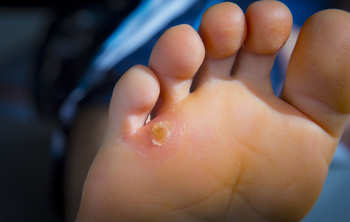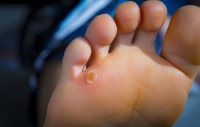
Foot corns are characterized by bumps that are thickened layers of hard skin and form on bony areas of the feet. They generally occur on the tops and sides of the toes, due to friction and pressure. Ill-fitting shoes and socks can contribute to their development. Some people with conditions that cause abnormal alignment of the bones in the feet, such as arthritis, bunions, or hammertoes, may be at a higher risk for developing corns. There are three types of foot corns consisting of hard, soft, and seed corns. Hard corns are firm when touched, and form on the tops of toes. Soft corns are pliable and typically form between the toes. Seed corns are very small and usually occur on the soles of the feet. Corns are sometimes confused with calluses but differ in location, size, tenderness, and inflammation. Preventing foot corns involves wearing well-fitting, comfortable shoes, and especially avoiding high heels and pointy-toed footwear. One can soak their foot and gently exfoliate the skin of the corn with a pumice stone or foot file. Covering the corn can protect against friction. If you have corns that are causing pain, or if you also have diabetes, it is strongly suggested that you make an appointment with a podiatrist who can provide additional treatment that can prevent complications.
If you have any concerns regarding your feet and ankles, contact Dr. Kenneth Donovan of Advanced Care Foot and Ankle. Our doctor will treat your foot and ankle needs.
Corns: What Are They? and How Do You Get Rid of Them?
Corns can be described as areas of the skin that have thickened to the point of becoming painful or irritating. They are often layers and layers of the skin that have become dry and rough, and are normally smaller than calluses.
Ways to Prevent Corns
There are many ways to get rid of painful corns such as wearing:
- Well-fitting socks
- Comfortable shoes that are not tight around your foot
- Shoes that offer support
Treating Corns
Treatment of corns involves removing the dead skin that has built up in the specific area of the foot. Consult with Our doctor to determine the best treatment option for your case of corns.
If you have any questions please feel free to contact one of our offices located in Warren, Livingston, and Toms River, NJ . We offer the newest diagnostic and treatment technologies for all your foot and ankle needs.

